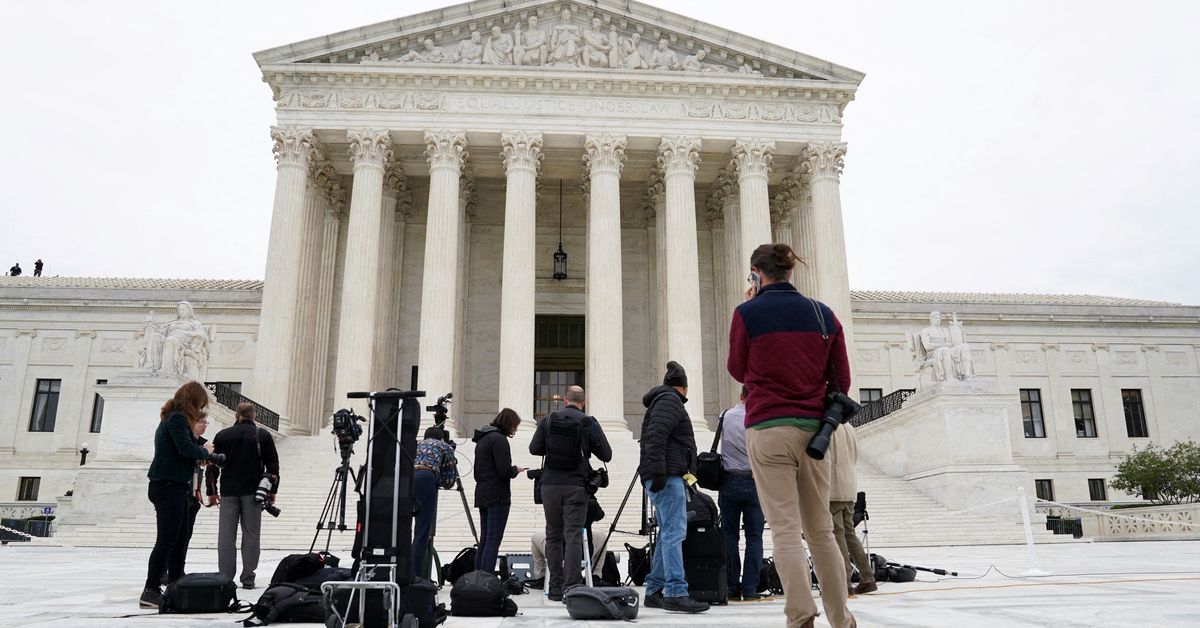Among Counterman’s communications to Whalen were messages that read: “Was that you in the white Jeep?” and “You’re not being good for human relations. Die. Don’t need you.” Others used expletives.
Whalen said the messages eventually left her paralyzed with fear and anxiety, causing her to cancel shows and turn down career opportunities, and leading her to apply for a concealed handgun permit and sleep with a light on.
The Supreme Court marshal asks state officials to act on protests at justices’ homes
https://www.npr.org/2022/07/03/1109614708/protests-at-homes-of-supreme-court-justices
In a series of letters sent over the weekend, the marshal of the U.S. Supreme Court called on officials in Maryland and Virginia to “enforce” state and local laws that, she wrote, “prohibit picketing outside of the homes of Supreme Court Justices.”
“For weeks on end, large groups of protesters chanting slogans, using bullhorns, and banging drums have picketed Justices’ homes in Virginia,” Marshal Gail Curley wrote to Virginia Gov. Glenn Youngkin. “This is exactly the kind of conduct that Virginia law prohibits.”
Curley sent similar letters to Maryland Gov. Larry Hogan, along with several Maryland and Virginia county officials.
Curley’s requests come after weeks of protests and picketing outside the homes of the court’s conservative justices in the Maryland and Virginia suburbs of Washington, D.C. The protests began in May after a draft leaked of the justices’ eventual decision to overturn Roe v. Wade.
Why are you shifting this argument so far? I never claimed the guy had tourette’s, and I never said this guy shouldn’t be insitutionalized. This is a completely irrelevant example.
Completely insane ruling. Wild that Kagan went across the aisle for this.
the First Amendment requires proofs of mental state
So I guess it’s basically impossible to convict anyone of anything involving speech? If I yell “fire” in a crowded theater, how can you prove I wasn’t having a delusion that there was a fire? Maybe there was an explosion in the movie and I was so immersed I thought it was real!
Dude had previous convictions and spent years doing this harassing, it’s not like this was an isolated mental break. Truly insane.
Seems like the ruling was correct. Colorado’s law seems too easy to convict.
Lawyers for the state responded that it was enough to look at the words in question, how they were conveyed and the response they elicited. The speaker’s subjective intent, they said, does not matter.
Threats have to have intent. I agree this case the defendant was likely guilty of making threats. But the SCOTUS was overturning the case on the grounds of the Colorado law. Not judging the defendant specifically. At least that’s how the above poster’s excerpts from Kagan’s decision and the 2 dissents from Barrett and Thomas read.
This guy, given his behavior, should absolutely be in a facility where he can’t do any harm.
However - I have known a few people with Tourette’s over the years, and can absolutely say that mental state and abilities should play a factor in whether or not something that’s done would violate the law.
Yelling “fire” in a crowded theater may not be something someone with tourette’s can control. If that causes a stampede and people get trampled, that’s not their fault, in my opinion.
The point I’m making is that the “fire” is a classic example of speech that isn’t protected in the US, but with this ruling there’s no way to prove intent. So what if I sat down and continued watching the movie afterwards? I just got over the delusion. And someone with tourette’s would probably apologize, try to calm people down, or even avoid a theater altogether. I’m pretty sure that someone with a peanut allergy can’t sue a peanut farm if they go visit and sample the produce; if you know there’s an extra danger for you specifically in performing an activity then you are responsible.
Not to mention tourette’s could never cause targeted, violent, electronic-message based harassment either. This is a focused, intentional action.
I don’t how it will affect your overall stance, but the “Yelling fire in a crowded theater” (aka, “clear and present danger”) test, which comes from Schenck v. United States, was overturned in 1979 with the case Brandenburg v. Ohio, which gave us the “Imminent Lawless Action” test, instead. This test requires:
- intent to speak, and
- imminence of lawlessness, and
- likelihood of lawlessness
Yelling fire in a crowded theater is only illegal if it meets that test-- all three requirements-- on a case by case basis.
Yeah, the fact that he sent messages over multiple years, opened various accounts after the artist blocked him, and was actively messaging her about seeing her in public is pretty cut-and-dry stalking. Death threats are damning as well. Sure, he might not be mentally stable, but that shouldn’t give him a pass for reprehensible and dangerous behavior.
To be clear, I do not agree with the ruling, but the ruling was on whether this was a federal or a civil matter. I think the government should strongly prevent clear harassment and reasonable threats of violence, but the supreme court decided that threats or words are not enough in this case. I think it’s particularly two-faced, especially in light of threats of violence being used regularly to prosecute minorities and identify potential terrorists, but threats of violence directed towards a single person in the context of years of harassing behavior and a known pattern of behavior were apparently not enough.
If I had to guess, the court was wary of allowing any potential attacks to the 1st amendment, as they have been want to do in the past - a famous example of this in (somewhat) recent history is when the supreme court held that the 1st amendment was more important than the stolen valor act passed just a few years earlier. The ruling doesn’t particularly surprise me, nor does Kagan swapping sides because in the US we have a strong free speech identity and free speech limitations in terms of harassment has almost never been ruled on (one might make the argument that virginia v. black might be one such case, but that’s a case of racially motivated hate speech which is not quite analogous here).








